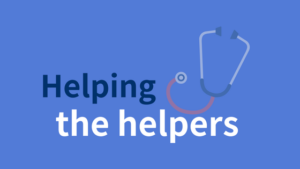
Every September, as part of National Suicide Prevention Month, our Active Minds chapter partners with our campus’ Wellness Resource Center and University Counseling Services to hold the Alive Mental Health Fair. The day-long event attracts thousands of students and uses interactive activities to teach about various aspects of mental health, suicide prevention, and accessing campus resources.
For our booth, we held a fact or myth activity about suicide and how to address mental health in college students as well as in careers. As I was browsing the internet for facts to put on our cards, I came across an article about professions with the highest rates of suicide – at the top of the list were doctors, dentists, and pharmacists. As I kept reading, I was shocked by the facts: as many as 400 doctors die by suicide every year, dentists suffer stress-related cardiovascular disease at rates much higher than the average population, medical students report rates of elevated rates of depression, etc. As a future healthcare professional myself, it was disconcerting to see all the numbers laid out. The statistics were abundant, but I had never once had a conversation with my educators or peers about mental health in this particular community.
Healthcare professionals are trained to be the caretakers of our society. They are the people we go to in terms of our needs, both in terms of physical and mental health. They are taught to see patients not just as a collection of symptoms, but rather, as person with emotional needs as well. As the bridge between mental and physical health strengthens, many clinics have begun to evaluate health holistically and incorporate mental health wellness plans into general practice. Additionally, mental health disorders are covered in formal education of almost all healthcare professions. Yet, it remains a rampant problem in the industry. Why is it that the caretakers of our society so disproportionately affected by some of the conditions they are trained to treat?
Mental health among doctors and other healthcare professionals is still an incredibly taboo topic, for a variety of reasons. They are exposed to unique stressors such as arduous training for several years, long working hours, and deep connections to terminally ill patients that can take a toll on emotional wellbeing. Clinicians have mentioned the fear of losing their licenses or credibility among peers if their personal mental health needs come to light. Additionally, many medical students relate to the feelings of imposter syndrome and needing to keep up a façade of a great work-life balance.
As I prepare applications for graduate school, I can’t help but wonder what I can do to start changing the culture of silence about mental health in my future profession. As a member of Active Minds, I’ve learned so much throughout the years about self-care and sparking conversation about taboo topics. I think one of the biggest sources of change can start with simply talking to peers and educating about the prevalence of mental health conditions. Teaching students in medical school and other healthcare programs to reach out for support in moments of stress or anxiety promotes positive coping-strategies early on in their careers. There are a lot of incredible organizations that have formed in the recent years to promote such conversation within the larger community, including The Doctors’ Support Network and British Dental Association. Additionally, more and more medical schools have been emphasizing self-care within students and creation of safe-spaces to address mental health. Personally, among my friends and I, we make an effort at least once a week to do something enjoyable completely unrelated to our studies or work obligations. It’s been a great way for us to reflect on our own mental health and simply recharge from the stress of school. I know I may face difficult situations along the way in my future career, but I hope that by building these habits early, I can effectively prioritize my mental health and work-life balance in the long-run.


